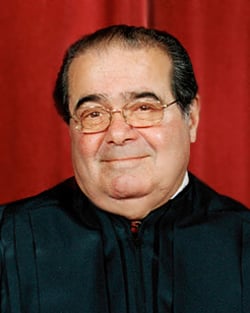Justice Scalia has died at the age of 79

Justice Antonin Scalia, an influential advocate for an originalist view of the Constitution, died on Saturday at the age of 79.
The New York Times describes Scalia as “leader of a conservative intellectual renaissance” due to his “transformative legal theories, vivid writing and outsize personality.” He was nearing his 30th year on the court and was its longest serving current member, the National Law Journal (sub. req.) reports.
Chief Justice John G. Roberts Jr. confirmed the death in a statement, the Washington Post reports. “On behalf of the court and retired justices,” Roberts said, “I am saddened to report that our colleague Justice Antonin Scalia has passed away. He was an extraordinary individual and jurist, admired and treasured by his colleagues. His passing is a great loss to the court and the country he so loyally served. We extend our deepest condolences to his wife Maureen and his family.”
My San Antonio was among the first to report that Scalia was found dead Saturday morning of apparent natural causes. Scalia was visiting Cibolo Creek Ranch, a resort in West Texas.
Scalia attended a private party at the ranch on Friday. His body was found on Saturday in his room after he did not show up for breakfast, according to My San Antonio.
Scalia once said the split on the U.S. Supreme Court wasn’t conservative versus liberal. Instead, he said, the court was split between originalists—he was an advocate—and those who believed in a living Constitution. Originalism, he has said, is “what did the words mean to the people who ratified the Bill of Rights and the Constitution.”
Using that philosophy, Scalia wrote the majority opinion in 2008 finding a Second Amendment right to own handguns in the home. At the time, the New York Times said it was Scalia’s most important opinion as a Supreme Court justice.
Scalia was known for his caustic dissents. When the U.S. Supreme Court found a constitutional right to gay marriage, Scalia’s dissent said the majority opinion was “lacking even a thin veneer of law” and it was filled with “mummeries and straining-to-be-memorable passages.” When the U.S. Supreme Court upheld the Obama administration’s health-care law, Scalia’s dissent said the majority advanced “argument after feeble argument” in an opinion made up of “interpretive jiggery-pokery.”
Nominated to the court in 1986 by President Ronald Reagan, Scalia had previously served on the U.S. Court of Appeals for the District of Columbia and chaired the ABA’s Section of Administrative Law from 1981-82, according to his Supreme Court biography.
Scalia, born in Trenton, New Jersey, on March 11, 1936, earned his A.B. from Georgetown University and the University of Fribourg, Switzerland, and his LL.B. from Harvard Law School.
He practiced law in Cleveland, Ohio from 1961–1967 before going into academia, where he was a law professor at the University of Virginia and University of Chicago.
The National Law Journal predicts a “major battle” over Scalia’s successor. “Because of Scalia’s pivotal role on the court’s right wing,” the article says, “Republicans could block almost any nominee put forward by President Barack Obama.”
SCOTUSblog founder Tom Goldstein also believes it unlikely that a successor could be confirmed before the presidential election in November. Though it is theoretically possible, Goldstein writes, “realistically, it cannot absent essentially a consensus nominee—and probably not even then, given the stakes.”
Senate Majority Leader Mitch McConnell, R-Ky., said on Saturday that Scalia should not be replaced until after the election, the Hill reports. The article views the comment as a signal that the GOP does not intend to confirm any nominee by Obama.
President Obama indicated he would nominate a successor. “Obviously, today is a time to remember Justice Scalia’s legacy,” he said in a statement. “I plan to fulfill my constitutional responsibility to nominate a successor in due time. There will be plenty of time for me to do so and for the Senate to fulfill its responsibility to give that person a full hearing and timely vote.”
In a separate SCOTUSblog post, Goldstein examines the impact of Scalia’s death on the current court term. Any votes cast by Scalia in cases that have not been publicly announced would be void. If Scalia’s absence produces a 4-4 split, the lower appellate decision would stand.
Cases that split 4-4 could include one challenging mandatory union contributions for public employees and another challenging the use of race in admissions at the University of Texas at Austin.
ABA President Paulette Brown issued a statement expressing the ABA’s deepest sympathy to Scalia’s family. Scalia’s “great intellect, dedication and service to the nation, the law and the American Bar Association will be missed,” Brown said. “Scalia served as chairman of the ABA’s Section of Administrative Law in 1981 and 1982 and its Conference of Section chairman in 1982 and 1983. He was a Senior Fellow of the ABA Section of Administrative Law and also appeared and participated in many ABA activities over the last three decades. In his 30 years on the Supreme Court, he made an indelible mark on American law and jurisprudence.”
Updated at 8:15 p.m. to add statement from President Obama.



